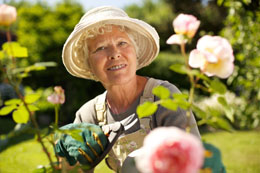Do you love roses? Taking care of them in the summer is important. This article tells you how to look after your roses during the summer months to make the most out of your rose blooms.

Although you've successfully accomplished your task in the spring time, that is to plant your new roses and to take care of the old ones, now summer is here and how lovely are those first buds you've been waiting for! Every gardener rejoices over his/her roses in beautiful bloom! If you are like me and love these flowers, I have gathered a few pieces of advice from the most experienced so as to make sure we do our best taking care of our roses in the summer time as well.
As most of you roses lovers know, the battle with those naughty insects that plan to suck the energy out of your roses continues from spring before the first buds open, until later on in the summer, when the flowers are in full bloom. Insecticide is the solution for summer pests such as thrips and spider mites but the Japanese beetles must be handpicked. Don't dream - as I did - that if you use pesticide once, it will do for the rest of the summer! Unfortunately, you'll have to repeat the spraying as often as you'll need to. I've also tried the homemade pesticide with water and soap but well... in my case it didn't really work that well, so I had to use some more aggressive chemical. You need to check your plant for disease and treat it the right way if the case.
A very common rose disease is powdery mildew when the leaves, buds, and stems of the rose are covered in a white powdery coat. It is a fungus that develops in warm humid weather but it can be reduced by means of proper sanitation - that implies removing all the dead or infected branches and keeping the rose aerated - and also by fungicide application. The fungicide should be applied each week or even more often if required, especially when new growth is affected or when there are frequent rains. You need to follow the instructions on the label and apply accordingly.
Another common rose disease is Black Spot, and it is caused by a fungus named Diplocarpon rosae. As its name already implies, this disease appears like black spots on the leaves and then the foliage turns yellow falling completely in early autumn, also as a consequence, the flowers lose the intensity of their color. Black spot can be prevented by means of proper sanitation but also fungicide needs to be sprayed once or even twice a week during rainy seasons.
However, in spite of all problems that might appear, summer is a time when the focus is mainly on fertilizing and watering the roses. They do well with plenty of fertilizer and don't mind benefiting from it in abundance: natural fertilizers such as manure or special rose food; mulch is also valuable as roses love being "spoiled" with these kinds of treats!
When it comes to watering, roses do best if they have enough water, which means once a week a good soak especially when it is very dry, but you should check the soil's moisture content and if the case water twice a week. However, it you allow the soil to dry (for seven days or so), the rose will be encouraged to develop new roots looking for water and it won't be lazy! When applying water, you need to know that it has to be put on the soil around the rose bush and not on the leaves, if you water the leaves in the evening, the moisture can cause powdery mildew and your plant will then be infected.
Once your flowers bloom and then fade away, you need to remove them if you want to encourage new flowers growth. Simply cut the stem up to two centimeters and use a clean disinfected tool so as not to spread diseases.If your roses have at least 6 hours of sun per day, they should do well and bloom abundantly; if you keep them in a rather shaded place that affects their development and they will still flower but the quantity and quality of the flowers are diminished.
To sum up, in the summer, keep a constant eye on your roses, checking them against disease, keep them fertilized (fertilizing period should stop in august) and watered as needed and you will enjoy their lovely and enchanting flowers for many years! If you take good care of them, the next year they will come back even stronger!






 Although you've successfully accomplished your task in the spring time, that is to plant your new roses and to take care of the old ones, now summer is here and how lovely are those first buds you've been waiting for! Every gardener rejoices over his/her roses in beautiful bloom! If you are like me and love these flowers, I have gathered a few pieces of advice from the most experienced so as to make sure we do our best taking care of our roses in the summer time as well.
Although you've successfully accomplished your task in the spring time, that is to plant your new roses and to take care of the old ones, now summer is here and how lovely are those first buds you've been waiting for! Every gardener rejoices over his/her roses in beautiful bloom! If you are like me and love these flowers, I have gathered a few pieces of advice from the most experienced so as to make sure we do our best taking care of our roses in the summer time as well.